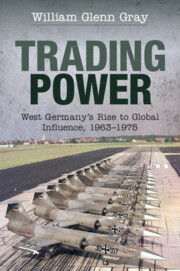Book contents
- Trading Power
- Trading Power
- Copyright page
- Contents
- Figures
- Acknowledgments
- Abbreviations
- Introduction
- 1 The Unraveling of Adenauer’s Grand Strategy (1962–1963)
- 2 America’s Junior Partner (1963–1964)
- 3 Twenty Years After (1964–1965)
- 4 The Stability Imperative (1965–1966)
- 5 Gaullist Temptations (1966–1968)
- 6 The Magnetism of Prosperity (1967–1968)
- 7 A Decisive Election (1969)
- 8 The Zenith of Ostpolitik (1970)
- 9 The European Pendulum (1970–1972)
- 10 Hazards from the Global South (1970–1972)
- 11 The Embattled Chancellor (1971–1972)
- 12 The Center of Europe (1973)
- 13 The Crisis Management Team (1973–1974)
- 14 New Structures for the West (1974–1975)
- Conclusion
- Select Bibliography
- Index
Conclusion
Published online by Cambridge University Press: 14 October 2022
- Trading Power
- Trading Power
- Copyright page
- Contents
- Figures
- Acknowledgments
- Abbreviations
- Introduction
- 1 The Unraveling of Adenauer’s Grand Strategy (1962–1963)
- 2 America’s Junior Partner (1963–1964)
- 3 Twenty Years After (1964–1965)
- 4 The Stability Imperative (1965–1966)
- 5 Gaullist Temptations (1966–1968)
- 6 The Magnetism of Prosperity (1967–1968)
- 7 A Decisive Election (1969)
- 8 The Zenith of Ostpolitik (1970)
- 9 The European Pendulum (1970–1972)
- 10 Hazards from the Global South (1970–1972)
- 11 The Embattled Chancellor (1971–1972)
- 12 The Center of Europe (1973)
- 13 The Crisis Management Team (1973–1974)
- 14 New Structures for the West (1974–1975)
- Conclusion
- Select Bibliography
- Index
Summary
German influence did not accrue automatically: from the early 1960s to the mid-1970s, leaders in Bonn learned how to better shape outcomes in accord with German interests. West Germany clarified its military role, renouncing nuclear weapons, rejecting “out-of-area” missions, and restricting weapons exports – all while building out the Bundeswehr’s conventional strength. West Germans learned that generous financial contributions (to the EC, NATO, and the UN) increased their clout; and that domestic economic stability could not be maintained in isolation. International monetary cooperation diminished speculative attacks, and support for struggling EC partners paid off. West Germans faced acute dilemmas in deciding between France and the United States, “Gaullist” or “Atlanticist” options; but the magnitude of Bonn’s pendulum swings lessened over time. German governments, particularly Brandt’s, learned to diminish Soviet hostility by accepting the territorial status quo, though they underestimated the ongoing salience of the “politics of the past.” On balance, during this period West Germany helped to create a world that played to its strengths as an economic giant.
- Type
- Chapter
- Information
- Trading PowerWest Germany's Rise to Global Influence, 1963–1975, pp. 461 - 469Publisher: Cambridge University PressPrint publication year: 2022



